(Mexico Moments, Part 1)
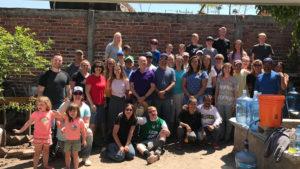 Donato squinted at us in the morning sunlight, translating Victor’s words across the table: “He says that whichever rooster speaks up next will be the volunteer for tonight’s dinner.” He was smiling at all of us still shivering in the shade. We were brothers huddled together around those tables, not brown and white, not missionary and Mexican. Bibles were opened, some with Spanish words filling the pages and others in English. On cue, a rooster crowed behind us. “There’s our volunteer!” Donato shouted, and laughter echoed off the cement walls of the courtyard. Scotty, a young man with Down Syndrome, was sitting next to Donato and Nate.
Donato squinted at us in the morning sunlight, translating Victor’s words across the table: “He says that whichever rooster speaks up next will be the volunteer for tonight’s dinner.” He was smiling at all of us still shivering in the shade. We were brothers huddled together around those tables, not brown and white, not missionary and Mexican. Bibles were opened, some with Spanish words filling the pages and others in English. On cue, a rooster crowed behind us. “There’s our volunteer!” Donato shouted, and laughter echoed off the cement walls of the courtyard. Scotty, a young man with Down Syndrome, was sitting next to Donato and Nate.
“Want me. . . pray Nate?” he asked.
“I think that would be great,” Nate said. Hats were removed. Luke, the 16-year-old sitting next to me, put his hand on my shoulder as Scotty began: “Thanks, Jesus, for brothers and sisters this last day. . .Amen.” We put our hats back on, and Donato was looking at Scotty, his arm extended to give him a fist bump.
“Scotty, you’re the man!” he said, loud enough for all of us to hear.
“Oh, come on. Whatever!” Scotty replied, his face lit up as bright as that morning sun, and whether it was the sun or Scotty’s smile, somehow, we all felt warmer.
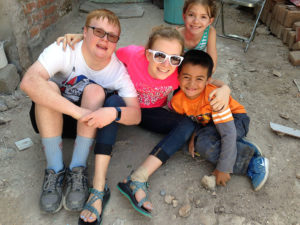 Donato was right. Scotty is the man. In the little town of Boquillas, a town our church is sent to every year, God was giving us warm tastes of Him, like the steaming canella we cradled in our hands, and those tastes of Him were coming through young people like Scotty. They were the ones leading the way.
Donato was right. Scotty is the man. In the little town of Boquillas, a town our church is sent to every year, God was giving us warm tastes of Him, like the steaming canella we cradled in our hands, and those tastes of Him were coming through young people like Scotty. They were the ones leading the way.
Nico was another one of those young people. Trying to find whatever shade I could, I sat in the dirt, painting the school wall. A little boy, smaller than most, found his way into my shade. His quietness stood out. There were no questions. No desperate attempts to grab my brush or reach into the orange paint. He just watched me. “Cuantos anos tienes?” I asked.
“Diez,” he answered, in almost a whisper. As I laid down blue tape, he moved quickly to meet me at the end of the wall, waiting to hold it down for me. We worked together in the shade.
“Bien Nico,” I shouted as he helped me move the paint tarp. Still no words came, only a smile. His nearness was calming. Being an introvert, I love being alone, but somehow, a few moments with this quiet little boy, squatting in the dirt, meant more to me than hours by myself.
Carlos wasn’t easy to handle. His big belly matched his mischievous smile. At only about three feet tall, you’d think that belly would weigh him down, but it didn’t. He zipped around the basketball court like a Mexican twister, snatching basketballs and cookies faster than anyone could blink. “There goes Carlos,” someone would mutter, and before an adult could grab him, he’d throw himself to the ground, laughing, his face covered in sweat. Being well above six feet tall, John looked to Carlos like a giant tree—the perfect playground equipment. With his arms wide open, Carlos would get a running start and then in the last possible moment, throw himself onto John, jumping as high as his round little body would go, and John was ready. As soon as that little boy arrived airborne, they both held on, but John wasn’t doing it to keep him from falling. He held on like a father. John, the “tree”, was offering God’s kind of shade to Carlos, the kind he was sent to bring, and although Carlos had no clue, God was using him too. His arms wrapped around John were the little arms of Jesus, offering a shade John never could have expected to beat the heat of the Boquillas sun.
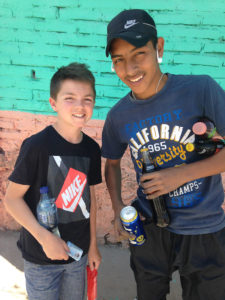 Later that week, my son David was sitting next to Juan as the bonfire crackled in front of them. Juan seemed to have an extra dose of life in him. He sang love songs to girls at the top of his lungs and climbed soccer goals. He rode his bike through the youth group meeting and did magic for anyone who would watch. To describe him as high energy would be an understatement, but he was also the one Donato was talking with about losing his dad. I didn’t understand the words, but I could hear the compassion in Donato’s voice, and I saw the tears in Juan’s eyes. He was sitting by my son in a circle of teenagers as he listened to his friend, Jairo, tell his story of God freeing him from addiction, and then he noticed something—David was shivering. I felt a tap on my knee and saw Juan looking back at me, the orange glow flickering off his face. He pointed at David and then wrapped his own arms around himself, acting like he was shivering. Neither of us spoke the other’s language, but the message couldn’t have been clearer. Juan watched intently as I took my hoodie off and wrapped it around my son. David pulled the hoodie tight around himself, enjoying its warmth, and Juan smiled, nodding at me in approval and looking back at the fire.
Later that week, my son David was sitting next to Juan as the bonfire crackled in front of them. Juan seemed to have an extra dose of life in him. He sang love songs to girls at the top of his lungs and climbed soccer goals. He rode his bike through the youth group meeting and did magic for anyone who would watch. To describe him as high energy would be an understatement, but he was also the one Donato was talking with about losing his dad. I didn’t understand the words, but I could hear the compassion in Donato’s voice, and I saw the tears in Juan’s eyes. He was sitting by my son in a circle of teenagers as he listened to his friend, Jairo, tell his story of God freeing him from addiction, and then he noticed something—David was shivering. I felt a tap on my knee and saw Juan looking back at me, the orange glow flickering off his face. He pointed at David and then wrapped his own arms around himself, acting like he was shivering. Neither of us spoke the other’s language, but the message couldn’t have been clearer. Juan watched intently as I took my hoodie off and wrapped it around my son. David pulled the hoodie tight around himself, enjoying its warmth, and Juan smiled, nodding at me in approval and looking back at the fire.
The little boy’s heart in Juan’s 16-year-old body was missing his dad. He missed the man who would wrap him up in love, and he was calling that out of me. Jesus said, “Whatever you do for the least of these, you do for me.” We find Him in places we “least” expect, and based on His words, we figure we’re the ones who are “doing.” We “do” the basketball camp, youth gatherings, and painting for the young people knowing we’re doing it for Jesus. Under the stars that last night as my son warmed up in my hoodie, I looked at Juan, sitting in the glow of that fire, and realized that maybe in the midst of us thinking we’re doing something for them, for “the least of these,” they’re actually doing something for us. Whether it was a hug from Carlos, a prayer from Scotty or a moment with Nico, the Jesus in them, the ones we typically call “the least of these”, was loving us.

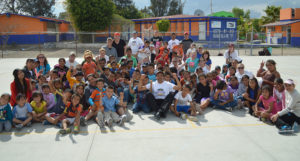
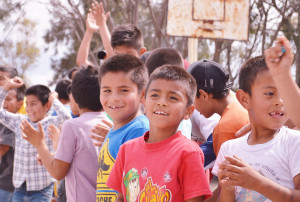
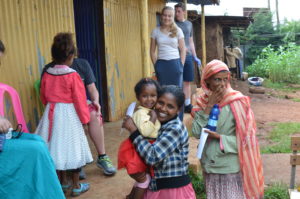
Wonderful, Erin. Have a blessed Easter!